
How to Stop Google Chrome from Tracking Your Location On Apple iPhone 15 Plus? | Dr.fone

How to Stop Google Chrome from Tracking Your Location On Apple iPhone 15 Plus?
Do you know your web browser is continually sharing your actual location online? You might not have noticed, but the number of websites using your location has increased. As you are well aware of the dangers of the internet, it doesn’t make sense to turn your Chrome into a beacon for ill-intentioned people. Luckily, it is possible to fake a location on Chrome with the right tool.
Are you wondering how to fake the browser location or which tool to use? You can get all your answers by reading this article till the end.

Part 1: How Does Chrome Know Your Location?
Before discussing Google Chrome’s fake location, it is important to know how Chrome detects your physical location. Google Chrome uses many ways to pinpoint your exact location, like your IP address, GPS, Wi-Fi, Bluetooth, and Cell Tower data. Every internet connection has an IP address bound to a location that enables Chrome to identify your location.
Similarly, GPS location can easily be tracked if your phone device has it enabled. All the Wi-Fi and Bluetooth connections around you also have location information embedded in them. They can help Chrome track you as long as your device can detect them. If you use cell data, Google Chrome can also track you through cell towers.
Part 2: How to Hide Location Services in Chrome?
If you are worried about Google Chrome detecting your physical location and sharing it with websites and apps, you can hide it easily. The process of hiding your location on Google Chrome is simple, even if you are using multiple devices. Below is the step-by-step process of hiding location services in Google Chrome on computer, Android, and iOS devices.
Method 1: For Laptop and Desktop PCs
Step 1: Launch Google Chrome on your computer and click the “Three Dots” icon to open the Google Chrome Settings. Here, tap “Privacy and Security” from the left sidebar and select “Site Settings.”

Step 2: Navigate to “Permissions” and click on “Location.” To hide the location on Google Chrome, select the “Don’t allow sites to see your location” option.

Method 2: For iPhone or iPad
Step 1: Navigate to “Settings” on your Apple iPhone 15 Plus and open it. Scroll down until you find the “Chrome” app option and select it.

Step 2: Press “Location” on the next screen to open the location options for Google Chrome. Here, choose “Never” to stop Google Chrome from detecting your location.

Method 3: For Android
Step 1: Open Google Chrome on your Apple iPhone 15 Plus, press the “Three-Dots” icon, and tap “Settings” from the options.

Step 2: In Chrome Settings, press “Site Settings.” Now select “Location” and hide your location by toggling off the “Location” option.

One way to protect your privacy and stop websites from tracking your location is to turn off the location, but it has many disadvantages. If you have turned off your location, you can’t use any location base service like food delivery, e-shopping, ride-sharing, etc. That’s why it is better to use a fake location on your browser. Below we have explained four methods for Chrome fake location.
Method 1. Best Tool to Fake Chrome Location On iOS and Android Phones
The easiest and quickest way to fake your location on Google Chrome is to use Dr.Fone - Virtual Location . Since smartphones contain a wide range of apps that require location access, it provides a stable way to fake Chrome locations on Android and iOS phones. No website or app will be able to detect that you are using a fake location when using Dr.Fone - Virtual Location for faking GPS location.
Key Features
- Dr.Fone - Virtual Location can be used for any social media app like Facebook, Twitter, or Instagram with a fake location.
- With the help of this tool, you can also spoof real-time tracking apps like Life360 to protect your privacy.
- If you are an iPhone user, you don’t have to jailbreak your Apple iPhone 15 Plus to spoof your device’s location.
How to Fake Chrome Location On iOS/Android Phones via Dr.Fone - Virtual Location
Faking your Chrome location with Dr.Fone - Virtual Location is very straightforward. You only need the Dr.Fone mobile toolkit and a USB cable to connect your Apple iPhone 15 Plus. Follow these steps to spoof Chrome location on Android and iOS phones:
Step 1: Connect Your Android/iOS Device to Your Computer
Connect your Android or iOS phone to your computer using a USB cable. Launch the Dr.Fone robust toolkit on your computer and select “Virtual Location.”

Step 2: Activate the Teleport Mode
Press “Get Started” on the next page to open the map window. First, select your actual location by pressing the “Center On” icon from the right sidebar. Afterward, click on the “Teleport” icon from the top right corner to activate the Teleport Mode.
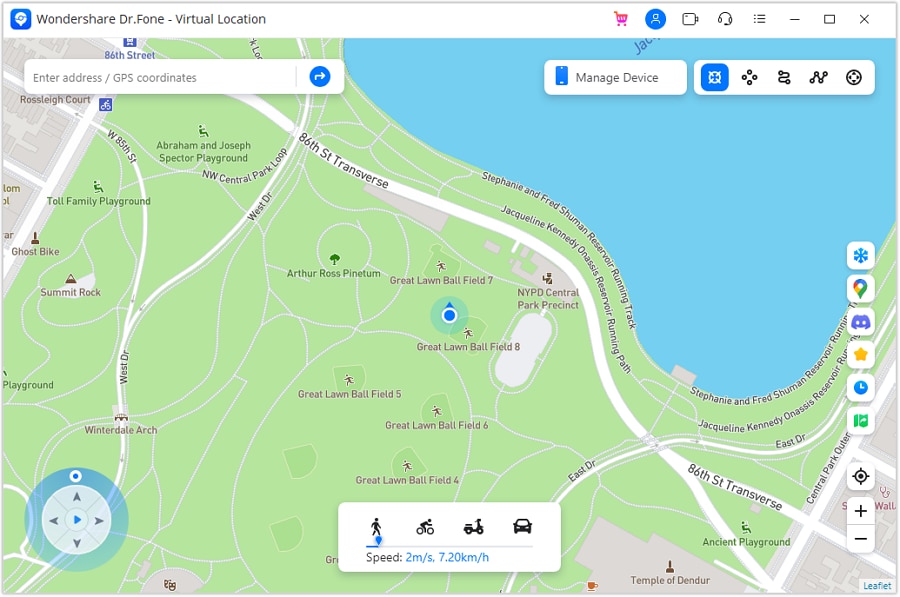
Step 3: Add the Desired Fake Location
Once the Teleport Mode is activated, add your desired location and press “Go.” Your desired location will open on the map. Select it, and a pop-up window will appear where you need to press “Move Here.” With that, your Android or iPhone’s Chrome location has been changed.
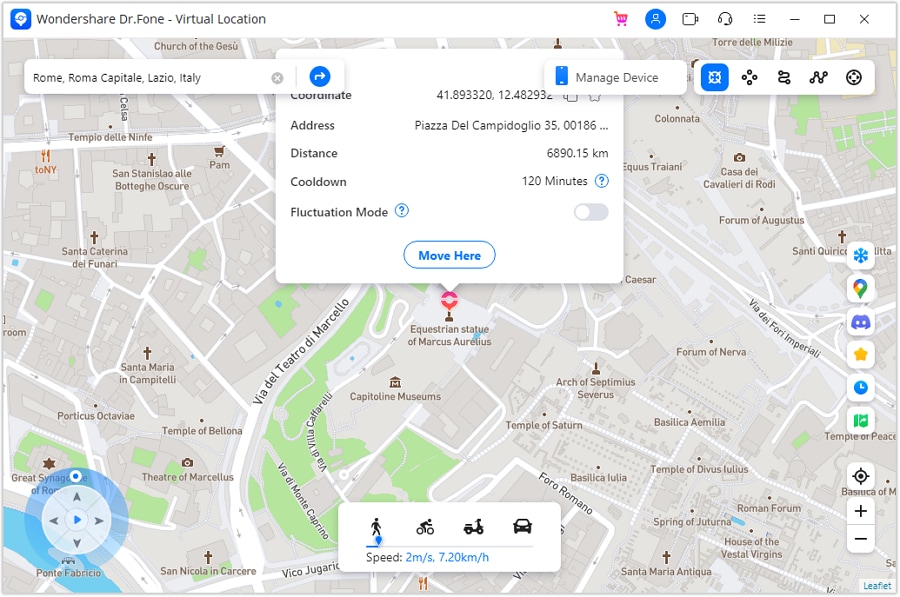
Method 2. Manually Change Your Location Using Google Chrome DevTools
It is also possible to fake browser location on Chrome using the Google Chrome Developer Tools. It is a built-in feature of Chrome and can be used to manually change or turn off your browser’s location. Follow these steps for changing location on Chrome with DevTools:
Step 1: After opening Google Chrome, click the three-dots icon from the top right corner. It will open the Chrome menu where you need to select “Developer Tools” after clicking “More Tools.”

Step 2: A window will open on the right side with all the developing tools you can use in Chrome. Click on the three-dots icon located near “Console” in the bottom left corner of the window. Choose “Sensors” from the pop-up menu.

Step 3: Access the newly selected “Sensor” option, and here you can change the browser’s location by either selecting a Google’s pre-set location or adding your desired location manually. Once the location is selected or added, your browser’s location will change.

Limitations
- The interface of the Google Chrome DevTools can be very confusing and overwhelming for non-technical users.
- Apart from pre-added locations, it can be hard to add a specific location as your fake location.
Method 3. Fake Your Location Using Chrome Extension
Many fake location Chrome extensions are available on Google Chrome which can be used to alter your location on Chrome. You can find these extensions on Google Chrome Web Store and add them directly to your browser. Below we have explained the steps for using such an extension “Location Guard “ to fake your location on Google Chrome:
Step 1: Open the “Location Guard” on Chrome Web Store and click “Add to Chrome” to add it to your browser. Once the “Location Guard” extension is added, open it and press “Options.”

Step 2: In the options, you can choose different options like Privacy Levels, Protection Area, and Time for Location Cache. It is recommended you choose a higher level for more protection.

Step 3: You can also use the “Fixed Location” feature to set up a fake location as a permanent location for your browser. The fixed location can be added by using the market or clicking on the desired place on the map.

Limitations
- Location Guard doesn’t protect your IP address. It means some websites can still detect your real location using the IP address.
- The app is not updated for quite a while, that’s why the map of the fixed location feature is quite restricted.
Method 4. Spoof Your IP Using a VPN Server
Another way you can fool websites and your browser by displaying a fake location online is to use a VPN server. VPNs fake your IP address to fool websites and apps into detecting your location. NordVPN is a VPN that can be used to spoof your IP by following these steps:
Step 1: Download and install NordVPN on your computer or phone and log in using your account. If you don’t have a NordVPN account, you must create one first.
Step 2: If you want to just change the location of your device, you can select “Quick Connect.” Using it will enable the program to automatically find the most suited fake location for you.

Step 3: You can also choose the desired location as your fake Chrome location in NordVPN. To do that, scroll down the list of countries and locations and choose your desired locations to connect to.
Limitations
- NordVPN can only spoof your IP address and will not work for geo-restricted applications.
- Using a VPN usually affects your internet speed and can make browsing slower and more difficult.
Part 4: FAQs
1.What is Geolocation?
Geolocation is a term used for the process of pinpointing the location of a device connected to the internet. The location can be determined using methods like IP address, GPS, and mobile tower data. Apps and websites commonly use it to provide location-based services.
2.What is the HTML5 Geolocation API?
The HTML5 Geolocation API is a browser API used to determine a user’s geographical location. Developers use it to build location-aware websites and apps that use users’ locations as the basis for providing their services. It can detect location through GPS, Wi-Fi, Bluetooth, IP addresses, etc.
3.Why should you hide or spoof your Location?
Hiding or spoofing your location protects your privacy and stop application and websites from tracking you. It also allows you to access geo-restricted apps and play location-based games. You can also fake your location to get the latest updates of your favorite apps.
Conclusion
The fact that Google Chrome in your devices can track your location with an accuracy of up to 20 meters is very unsettling for users. Even when you try to be careful in granting location permissions to apps and websites, many can still bypass this by adding location access requirements in terms and conditions.
That’s why having a tool like Dr.Fone - Virtual Location to fake GPS online is essential nowadays. It can ensure your privacy and helps in protecting you from the dangers of the internet.
Life360: Learn How Everything Works On Apple iPhone 15 Plus
Nothing is more important than your mobile device when it comes to your security, privacy, and family. Thanks to its easy-to-use features and excellent app, with Life360, your life will be as secure and private as possible.
Whether you’re looking to sync photos, videos, contacts, messages, and locations with your mobile devices and computers or simply set up your home cameras to automatically send you alerts, Life360 is designed to be the most powerful mobile phone service provider you’ve ever seen.
It’s the most secure and easiest-to-use service, but it’s not the cheapest. So, let’s know what Life360 is and how Life360 work.
Part 1: What Is Life360?
A smartphone software called Life360 tracking system enables families to communicate, track their whereabouts, and get alerts about their loved one’s safety and well-being.
When Life360 is installed on the phone, the administrator may create geo-fences specifying certain locations. For example, geo-fences might be employed to monitor family members’ arrival and departure times. In addition to that, the program provides driving analysis by means of the Life360 Driver Protect module.
Additionally, BMW has incorporated Life360 into its onboard location tracking. Accident identification and rescue operations are provided through an app that tracks authorized drivers and offers monitoring and analysis.
Both parties need to have the app installed for one to be able to monitor the activities of the other. Using the app, you can see where your phone is at any given moment. A member of your family might know exactly where you are at any given time if they have the app on their phone.
Whether you are currently using the app or not, the Life360 app tracker will always be able to pinpoint the exact location of your mobile device. In addition, you may obtain real-time location information on each other, view it on a hidden map, and even choose to get automatic notifications anytime someone enters or departs a spot, according to the Life 360 website.
Every time a family member departs or comes someplace, an alert is sent to the rest of the family. You can share your location with an adult, and they can see how fast you were driving, how long it took you to come home, and who was home or at school while you were gone.
In addition, adults and children may obtain real-time instructions from a particular family member. For example, you may touch an icon of a family member to receive instructions to that user’s location on the Life360 website.
Part 3: Is Life360 Always Accurate?
Previously, Life360 was criticized for being inaccurate, especially when locating people. However, the company has recently updated its system to ensure that the data it collects is accurate.
The Life360 app uses GPS technology to track your location. When you first install the app, you will be prompted to set up your location. This is done by entering your zip code, city, and state.
You will also be asked to select a default location. This will be used to determine your home address. Once you enter your zip code, city, and state, you will be able to view your location on a map.
Also, Life360 works best in urban areas. If you live in an area with many tall buildings, Life360 may not work as well.
Part 4: Is Life360 Safe for Your Privacy?
Life360 is a relatively new app, but it has been getting attention lately. People are wondering whether it is safe for them to use and whether or not it is worth it.
According to the Life360 website, the app is safe because it is encrypted. The encryption ensures that no one can intercept your communications.
If you are worried about privacy, you can disable the app’s location tracking feature. You can also disable the feature if you want to be notified whenever someone enters or leaves a particular area.
You can also use the app without giving anyone else access to your location. You can create a guest profile.
There are no ads or in-app purchases. You do not have to give any information to Life360. You can use the app without giving any information.
Life360 is also very easy to use. You do not need to have any special training to use the app. You simply need to sign up and download the app.
Life360 is available for free on Google Play and Apple App Store.
Part 5: Can a Location be faked on Life360?
What if You do not want your location to be tracked by someone else? One of the main reasons why people use Life360 is that it allows you to share your location with friends, family, and even strangers. However, if you do not want to be tracked by others, you need to know how to fake your location.
Unfortunately, you cannot spoof your location through Life360, so it is evident that you have to use another way to ensure that no one will know where you are. The easiest solution is an application called Dr.Fone - Virtual Location which can help you change your location in real-time.
Dr.Fone - Virtual Location is a comprehensive data management desktop software, which helps you to get all your data in one place and protect your important files from being lost. The software is easy to use and compatible with all Android and iOS devices.
You can also remotely wipe sensitive data and settings from any device at any time. With this software, you can backup your contacts, messages, photos, videos, call history, etc., to your PC or to the cloud service. All these features come as part of this.
Setting a virtual location is one of the prime role Dr.Fone plays.
Dr.Fone - Virtual Location
1-Click Location Changer for both iOS and Android
- Teleport from one location to another across the world from the comfort of your home.
- With just a few selections on your computer, you can make members of your circle believe you’re anywhere you want.
- Stimulate and imitate movement and set the speed and stops you take along the way.
- Compatible with both iOS and Android systems.
- Work with location-based apps, like Pokemon Go , Snapchat , Instagram , Facebook , etc.
3981454 people have downloaded it
Steps To Fake Your Location with Dr.Fone Virtual Location
Downloading Dr.Fone - Virtual Location (for iOS or Android) is the first thing that has to be taken. After that, run the executable file to begin using the application.

Step 1: After going through all of the available choices, choose “Virtual Location,” and then connect your Apple iPhone 15 Plus or Android phone to your computer. Select “Get Started” from the drop-down menu.
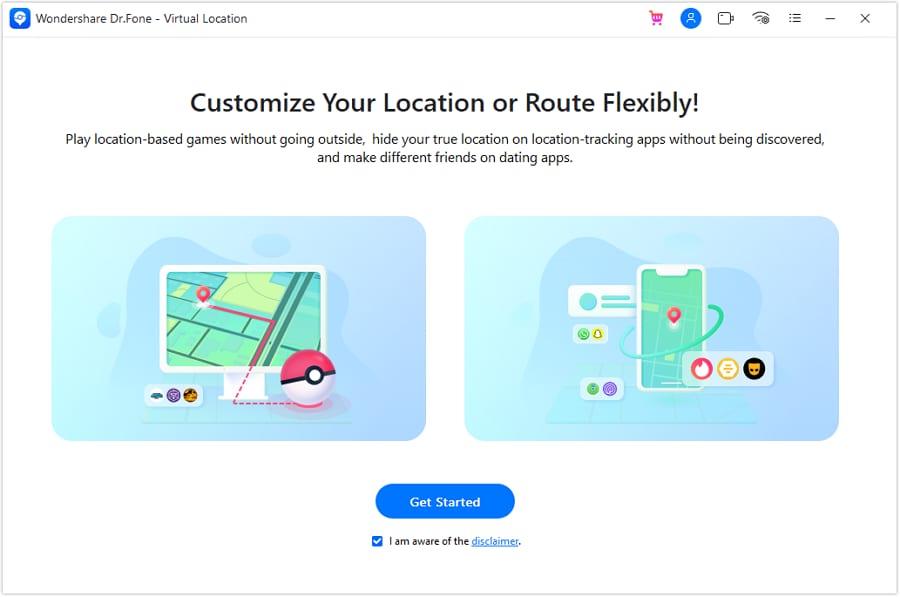
For iPhone users, after the program has been linked via a USB cord, it is possible to connect wirelessly without a connection.
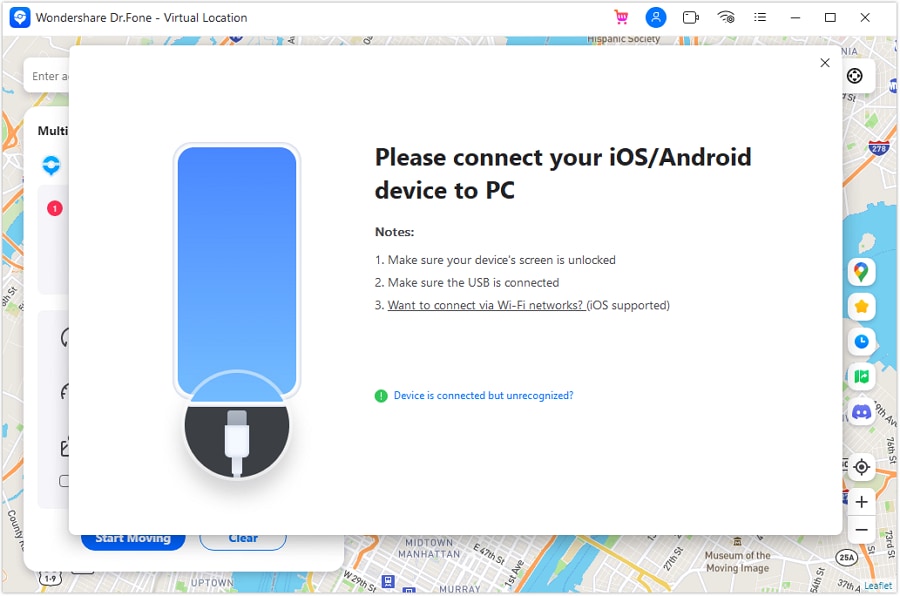
Step 2: You may see your current position on a map in the new window. If you are having trouble finding your current position when looking for locations on the map, you may hit the “center on” symbol that is located in the side to the right of the map to reveal your exact location.

Step 3: Tap the matching icon in the top right to enter “teleport mode.” It’s as simple as entering your destination location in the top left corner and clicking on the “go” button. Let’s look at Rome, Italy, as an illustration of this.
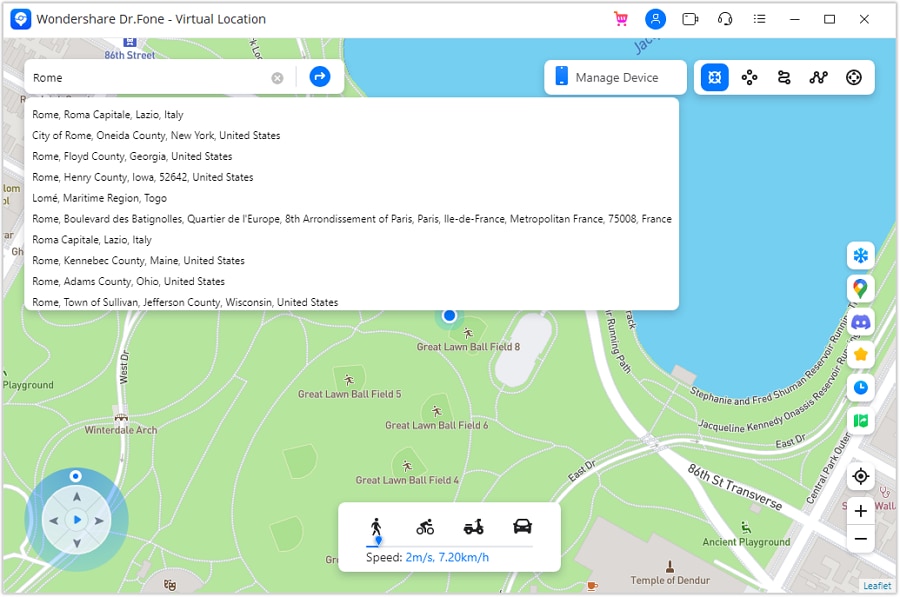
Step 4: It’s clear to the system that Rome is your destination. To relocate, choose “Move Here” from the menu that appears.

Step 5: Now you’re in Rome instead of wherever you were before. Your iOS or Android smartphone will always show Rome, Italy as your location, regardless of where you really are. This is the exact same location that appears in your location-based program.
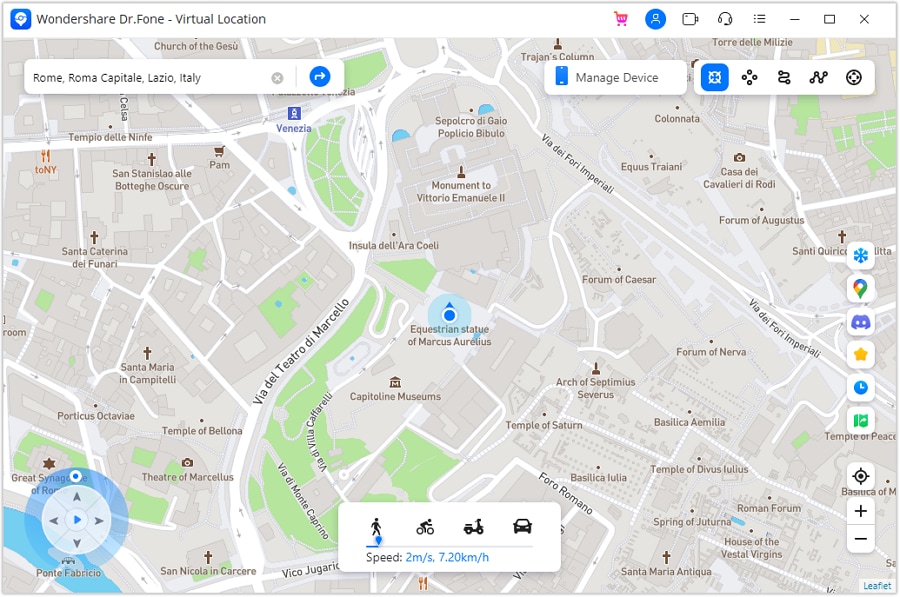
Part 6: FAQs
1. What are Life360 events?
Although Life360 events are a great way to keep your loved ones informed about your whereabouts, they also provide information about your location, like the weather, time, and date. You can even set an alert when you arrive at a specific location.
For example, if you want to see who is at your house, you can set an event to notify you when someone enters or leaves your home.
2. What does protecting a drive on Life360 do?
Improve your family’s driving habits by getting a weekly picture of everyone’s driving habits. Gain a comprehensive understanding of the driving patterns of every member of the Circle.
Find out about things like your highest speed and whether or not you text while driving, among other things. Then, take a look at individual drives to find out details such as the exact route taken, the number of kilometers recorded, the peak speed, driving style, and the locations of any driving incidents.
When Circle members are on the road, whether driving, using public transportation, or traveling with companions, keep an eye on their peak speed.
3. Why does life360 show walking instead of driving?
In brief, it is because walking is less likely to be used for commuting than driving. For example, if you live in a rural area, you may not have access to public transportation, and therefore, you would have to walk to work.
4. What does it mean when life360 doesn’t update?
It means that the Apple iPhone 15 Plus device you’re using is not connected to the internet. In this case, you should check if your internet connection is working properly. If you’re sure your internet connection is working fine, try restarting your device.
5. Does Life360 work when your phone is off?
In the event that you switch off your phone, the GPS feature will also be disabled. As a result, it will not be able to determine your position when your phone is turned off.
However, Life360 will continue to provide the most recent location data uploaded to your account. So, a life360 login online is necessary.
Conclusion
Life360 is a useful application that helps you keep tabs on your loved ones. You can track location, receive notifications, and get alerts. But if you want to fake your location, Dr.Fone - Virtual Location is the most recommended product because of its unique features and easy-to-use interface.
What is Geo-Blocking and How to Bypass it On Apple iPhone 15 Plus?
Have you ever entered a website and can’t access it because it is unavailable in your area? This is what geo-blocking means. If you want to know more about geo-blocking, you have come to the right article. This article provides the definition, symbols, function, type, and how to bypass a geo-blocked site.
Encryption is often used in geo-blocking as a means of protecting material that is restricted to users in just certain locations. In its long existence, the method has been met with several obstacles. These obstacles will be discussed in the next sections!

Part 1. What is Geo-Blocking?
This section will give you the definition of geo-blocking. It will also show how websites inform viewers that they are in geo-blocking areas.
Definition of Geo-Blocking
Geo-blocking is the practice of restricting online access to certain users depending on where in the world they happen to be physically located. Telecommunications firms, websites, and other content providers and intellectual property owners often use this method for copyright protection. To monitor and enforce geo-blocks, databases that map out IP addresses’ geographical locations are often employed.
Understanding the Main Symbols and Elements
You sometimes can’t access a site because it isn’t available in your area. This is the main element carried by geo-blocking.
Every online-surfing tool has a unique identifier called “IP address”. The address can identify the Apple iPhone 15 Plus devices’ geographical location. When users access a website, their devices send their IP addresses to the online servers. The servers read if the IP addresses are included in the allowed list and determine whether to allow the visitors to view the content.
The visitors usually know they are geographically limited through the website’s displayed outcomes, a poster indicating that the service is unavailable in the location. Take the geo-banned access by Airbnb as an example below.
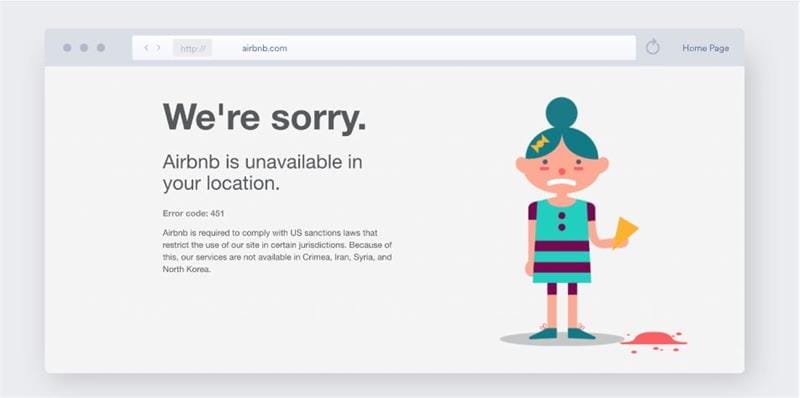
Although Airbnb has been criticized for posing a threat to the availability of low-cost lodging in metropolitan areas, it has proven to be a useful resource for travelers. However, not everyone can use it; for instance, it is unavailable in Iran due to US sanctions.
Part 2. How Does Geo-Blocking Work?
When a firm, rather than a government, is responsible for geoblocking, IP addresses are often the first line of defense. Your IP address is like a street address, revealing where you live.
IP addresses are numerical identifiers that distinguish each machine on the internet. Your computer’s IP address is sent to the server of the website you visit so that it may supply the required data.
You’ll be assigned an IP address when you sign up for an Internet Service Provider. It is possible to pinpoint the location of your device using its IP address, albeit the degree of precision may vary. Websites use the IP address to determine whether you can read their content. They will thus refuse your request if you are using an IP address that’s not on their approved list.
Part 3. Common Types of Geo-blocked Content
The difficulty stems from legal hurdles, including copyrights, licenses, and territorial disputes. Certain streaming services may not make all of their offerings accessible in all regions, or a major online shop may restrict some of their offerings to customers in just one geographic area.
Youtube
Users who upload videos can restrict access to them in certain countries. This nearly usually indicates that a business has chosen that you shouldn’t be able to see a video because of where you are located.

Spotify
You may be trying to find a method to unblock Spotify because you want to listen to unavailable music in your country or because the app has been prohibited in your area.
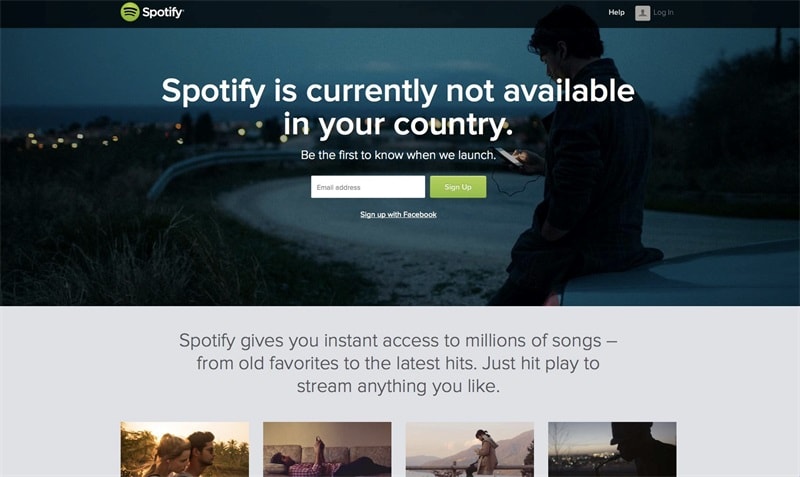
Live Sports
Big events may be aired exclusively by one company, which means you may be forced to pay to access certain material or go through annoying subscription hoops.

Pandora
Do you want to tune in to this online radio and music station? You can’t access it anywhere in Europe because of a regional firewall.

Porn sites
Artists from porn sites can now geo-block their movies, much like YouTube users do. Some porn sites have been outlawed in several countries, including Egypt and Pakistan, where the vast majority of the population resides.

Amazon
Amazon Prime geo-blocks other services as well as its streaming content. Games, ebooks, software, audiobooks, and other digital materials like TV and movies may be licensed and copyrighted. Amazon Prime prevents certain VPN IPs from accessing foreign content, including Netflix.

Part 4. Tips to Bypass Geo-Blocking
While certain sites may be blocked in your country, there are still methods to access the full functionality of the web. What exactly are they, and how do you go about getting them? Here’s more reading material.
Method 1. Use Smart Domain Name System (DNS)
Clever DNS can evade geoblocking if your smart TV, streaming box, or gaming console doesn’t support VPNs or proxy servers. Some home routers can generate VPN connections, but not all.
By changing your DNS address, clever DNS may alter your device’s virtual location. Smart DNS replaces your Internet provider’s DNS server. Netflix.com’s IP is not netflix.com. You’ll acquire the smart DNS provider’s transparent DNS proxy IP. Netflix thinks you’re in the US since this proxy server is.
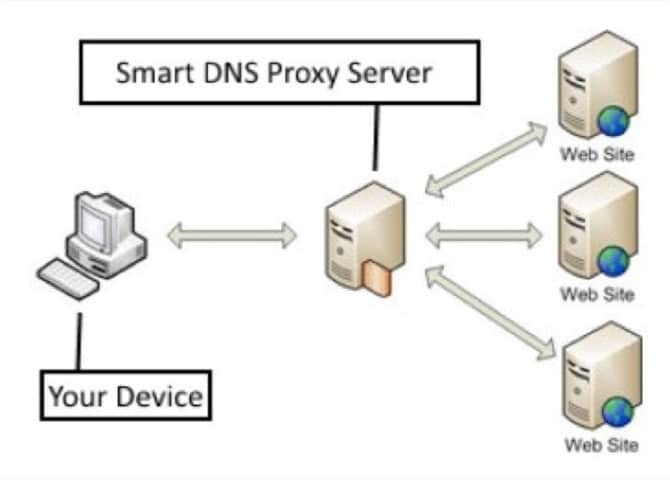
Method 2. Connect to Proxy Servers
Rather than connecting you directly to the server housing the material you want, a proxy server functions as an intermediary. A proxy server does what its name implies: it acts on your behalf to get access to the data and then forwards it to you. Proxy servers, especially those in foreign countries, may be used to get around geographical restrictions.
Depending on the kind of proxy server you use, you may or may not be able to conceal your IP address when surfing the web. Proxy servers are available online and may be accessed from any web browser. Setting up a proxy server is easy, but your activity may still be vulnerable since proxies don’t secure your data.
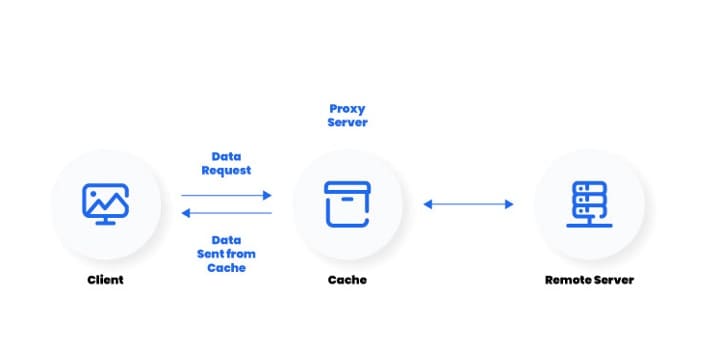
Method 3. Use the Tor Browser
In addition to using a VPN, you may use the anonymous Tor browser. The Tor browser links to the Tor network, a collection of computers that collaborate to conceal your online footprint by relaying your traffic via several intermediary nodes.
Tor employs a technique called “onion routing” to conceal its users’ identities. Since more time is required to traverse these additional levels, your internet speed may suffer as a consequence.
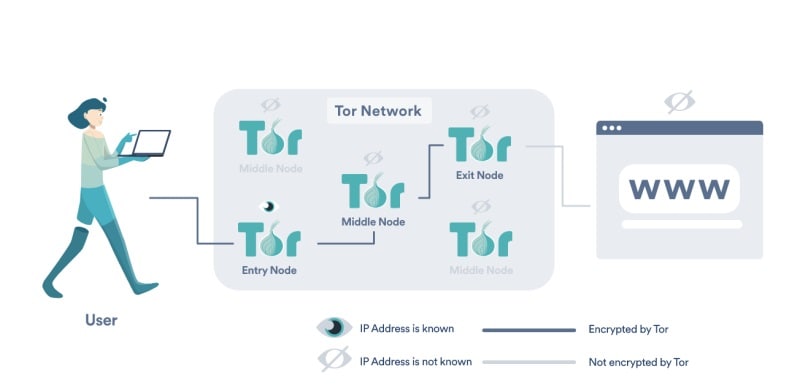
Method 4. A Good VPN Connection
A virtual private network (VPN) may hide your online identity and protect your data by encrypting your connection. VPNs allow you to get around geographically restricted material by redirecting your connection via a server in another country. This will allow you to connect to VPN servers in other countries, such as the United States, the United Kingdom, or Australia.
With effective VPN tools , you can surf the web anonymously, unblock geo-blocked content, and watch your favorite programs abroad. There are several advantages to utilizing a VPN, particularly when you travel or use public Wi-Fi, and they are simple to set up.
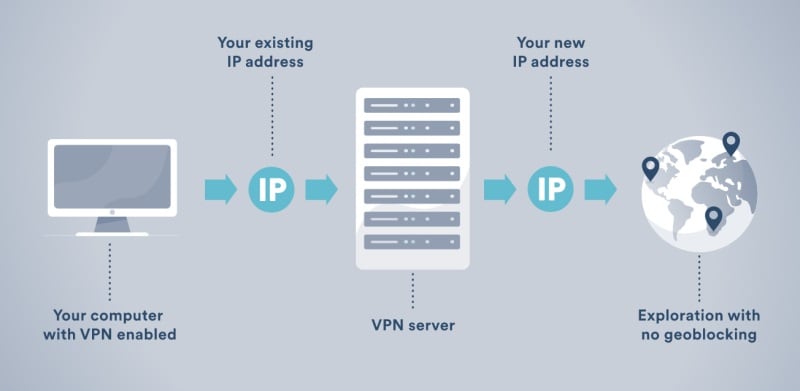
Part 5. FAQs About Geo-Blocking
Here are the answers to four questions that you might ask about geo-blocking.
1. Is Geo-Blocking Legal?
Yes. It’s legitimate. Limiting access to websites and services based on a user’s location is lawful. This practice is routinely used in nations like China to prevent citizens from seeing politically sensitive material. Legal arrangements, such as licensing agreements, may also be enforced by geo-blocking.
2. Is Bypassing Geo Blocking Illegal?
It depends. Depending on the situation, the nation, the purpose of the use, and the technique used, geo-blocking circumvention may be against the law. Copyright regulations prohibit users from accessing material beyond its designated location, yet many providers are reluctant to penalize users for doing so.
3. What’s the Difference Between Geo-Fencing and Geo-Blocking?
Geo-fencing is to create digital fences on which to base real-world judgments about where to go. One may draw a boundary around it using longitude and latitude lines on a map to easily establish who is permitted inside a certain region. Restricting access to material based on a user’s physical location is called “geo-blocking.”
4. Is Geo-Restricted the Same as Geo-Blocking?
They are the same. Restricting a user’s ability to access certain online resources depending on their location is known as geo-blocking or geo-restriction. To safeguard their license agreements, foreign media streaming firms often use the practice of geo-blocking.
Conclusion
For several reasons, media and content producers use geo-blocking. Although geo-blocking is unlikely to ever go out of style, there are techniques to circumvent it. Use a virtual private network (VPN) to bypass geo-restrictions on the material you want to watch. Using a Virtual Private Network (VPN), a proxy server, the Tor network, etc., your online location may be hidden or masked.
Geo-blocking controls. It’s both useful and abused. Website banning discriminates and manipulates. Geography may be annoying and frustrating. Sadly, they may always be in style. You don’t have to tolerate them!
Also read:
- [Updated] Reveal the Disenchanted Instagram's Unfollowers for 2024
- 2024 Approved Preparing for Twitter Know the Required Aspect Ratio
- All Must-Knows to Use Fake GPS GO Location Spoofer On Nubia Z50S Pro | Dr.fone
- Complete Tutorial to Use GPS Joystick to Fake GPS Location On Tecno Spark 10 Pro | Dr.fone
- Dose Life360 Notify Me When Someone Checks My Location On Honor X50 GT? | Dr.fone
- Ersetzen Sie DBAN Mit Diesen Drei Langlebigen Tools Zur Sicheren Festplattenformatierung Und Datenbereinigung
- Expert Guide to Fixing Lego Star Wars Series on Your PC – Skywalker Saga Edition
- Thinking About Changing Your Netflix Region Without a VPN On Sony Xperia 10 V? | Dr.fone
- What Is the HackTool:Win32/Keygen Malware? How to Remove It on Windows
- Title: How to Stop Google Chrome from Tracking Your Location On Apple iPhone 15 Plus? | Dr.fone
- Author: Ava
- Created at : 2025-02-14 17:57:47
- Updated at : 2025-02-18 16:57:11
- Link: https://fake-location.techidaily.com/how-to-stop-google-chrome-from-tracking-your-location-on-apple-iphone-15-plus-drfone-by-drfone-virtual-ios/
- License: This work is licensed under CC BY-NC-SA 4.0.